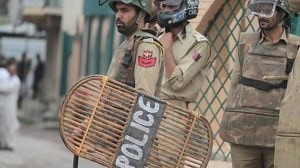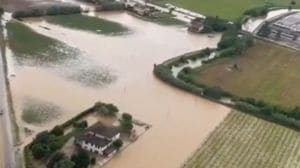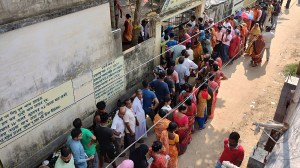- India
- International
Explained: Pakistan’s Taliban problem, on either side of Afghanistan border
The Pakistani foreign ministry said terrorists belonging to the TTP's Hafiz Gul Bahadur group were targeted on March 18, after the outfit claimed responsibility for a recent attack on an army outpost in Khyber Pakhtunkhwa province.
 The Tehreek-e-Taliban Pakistan was set up in 2007 as an umbrella group of several militant outfits with the aim of imposing a strict version of Islam on the country.
The Tehreek-e-Taliban Pakistan was set up in 2007 as an umbrella group of several militant outfits with the aim of imposing a strict version of Islam on the country.On March 18, Pakistan announced that it had carried out airstrikes against militants affiliated with the Tehreek-e-Taliban Pakistan (TTP) inside Afghanistan. The Taliban regime in Kabul said the Pakistani strikes had, in fact, killed five women and three children.
The Pakistani foreign ministry said terrorists belonging to the TTP’s Hafiz Gul Bahadur group were targeted after the outfit claimed responsibility for the March 16 attack on an army outpost in Khyber Pakhtunkhwa province in which seven personnel, including two officers, were killed.
The Pakistani military said the attack in North Waziristan was carried out by terrorists who had “safe haven” across the border in Afghanistan, and alleged that the “recent wave of terrorism has the full support and assistance of Afghanistan”.
The Pakistan Foreign Office said that over the past two years, it had “repeatedly conveyed its serious concerns to the interim Afghan government over the presence of terror outfits”.
On his part, the spokesperson for the Kabul regime, Zabiullah Mujahid, said, “The Islamic Emirate of Afghanistan does not allow anyone to compromise security by using Afghan territory.”

The Pakistani Taliban
The Tehreek-e-Taliban Pakistan was set up in 2007 as an umbrella group of several militant outfits with the aim of imposing a strict version of Islam on the country.
The TTP has ideological linkages with the Afghan Taliban, whom the Pakistani security establishment had nurtured for many years. Pakistan had expected that the regime that came to power in Kabul in August 2021 would stop the use of Afghan soil against Pakistan by expelling TTP operatives.
However, Pakistan says Kabul has refused to rein in the TTP. The country’s Special Representative to Afghanistan Ambassador Asif Durrani said on March 16 that some 5,000-6,000 TTP militants have taken shelter in Afghanistan.
The American bombing of Afghanistan in the aftermath of the terrorist attacks of September 11, 2001 drove the original Taliban leadership in Kandahar to Quetta, capital of Pakistan’s Balochistan province, where the hardline Islamist movement gained more cadres and newer leaders.
“Contrary to popular perception that the Pakistani Taliban movement emerged after the 11 September attacks, the movement was in fact already active in Afghanistan and only returned home after the demise of the Afghan regime,” the journalist Abubakar Siddique wrote in his book The Pashtun Question: The Unresolved Key to the Future of Pakistan and Afghanistan (2014).
While the leadership and the majority of Taliban cadre were from Waziristan, the movement attracted followers and allies from across Pakistan’s Federally Administered Tribal Areas (FATA), Khyber Pakhtunkhwa province, the eastern Punjab province, and the southern Sindh province, Siddique wrote.
Terrorist attacks in Pak
The Pakistani government blamed the TTP for the December 2007 assassination of former Prime Minister Benazir Bhutto, and the US CIA confirmed in January 2008 that it believed the TTP was involved. The TTP denied the accusation.
“At the zenith of its power, the TTP’s extended network sometimes controlled large swaths of territory in north-western Pakistan. Baitullah Mehsud, the founding leader of the TTP, appeared on Time Magazine’s Time 100 list of the world’s most influential people in 2008. But his August 2009 death in a US drone strike precipitated the TTP’s decline,” Siddique wrote.
Among the many attacks the TTP has claimed over the years, two stand out: the school-bus shooting of Malala Yousafzai, the winner of the 2014 Nobel Peace Prize who was then a young activist blogger, and two other schoolgirls in October 2012; and the attack on the Army Public School in Peshawar in December 2014, in which 132 schoolchildren between the ages of eight and 18, and nine school staff, were massacred.
‘Snakes in backyard’
Pakistan’s frustration with the Afghan Taliban’s refusal to act against the TTP reminds many in New Delhi and elsewhere of former US Secretary of State Hillary Clinton’s observation that Pakistan could not nurture snakes with the expectation that they would only bite its enemies.
In 2011, Clinton said at a joint news conference with then Pakistan Foreign Minister Hina Rabbani Khar: “It’s like that old story — you can’t keep snakes in your backyard and expect them only to bite your neighbours. Eventually those snakes are going to turn on whoever has them in the backyard.”
In 2014-15, the Pakistan armed forces carried out Operation Zarb-e-Azb, an expansive operation against militants including the TTP in the country’s north west, killing an estimated 3,500 insurgents.
“For India and Afghanistan, military strikes against the TTP confirmed further that the Pakistan Army did have the capacity to act against terrorists but it was selective in doing so and clearly excluding from its action groups which targeted India and Afghanistan,” the former Indian High Commissioner to Pakistan, T C A Raghavan, wrote in his book, The People Next Door: The Curious History of India’s Relations with Pakistan (2017)
In an article published in the Pakistani daily Dawn on March 20, Zahid Hussain, a leading commentator, pointed to evidence that the Afghan Taliban were involved with the TTP in conducting cross-border attacks on Pakistan, and expressed concern over the potential use of modern weapons left behind by NATO and the former Afghan army.
Hussain noted that given their old connections and ideological proximity, the Afghan Taliban would not take action against their fellow jihadists.
“There is no doubt that the Afghan Taliban’s return to power has been a major contributory factor in the revival of terrorist violence in Pakistan. However, the absence of a coherent strategy on Pakistan’s part has also allowed the TTP to claw back some lost space…Indeed, the policy of appeasement has come back to haunt us,” Hussain wrote.
For New Delhi, this is a we-told-you-so moment. It would want Prime Minister Shehbaz Sharif and Army Chief General Asim Munir to take concrete steps over the next few months against all terror outfits irrespective of their motivation, so that a possible window for a dialogue with New Delhi is opened.
More Explained
EXPRESS OPINION
May 19: Latest News
- 01
- 02
- 03
- 04
- 05








































